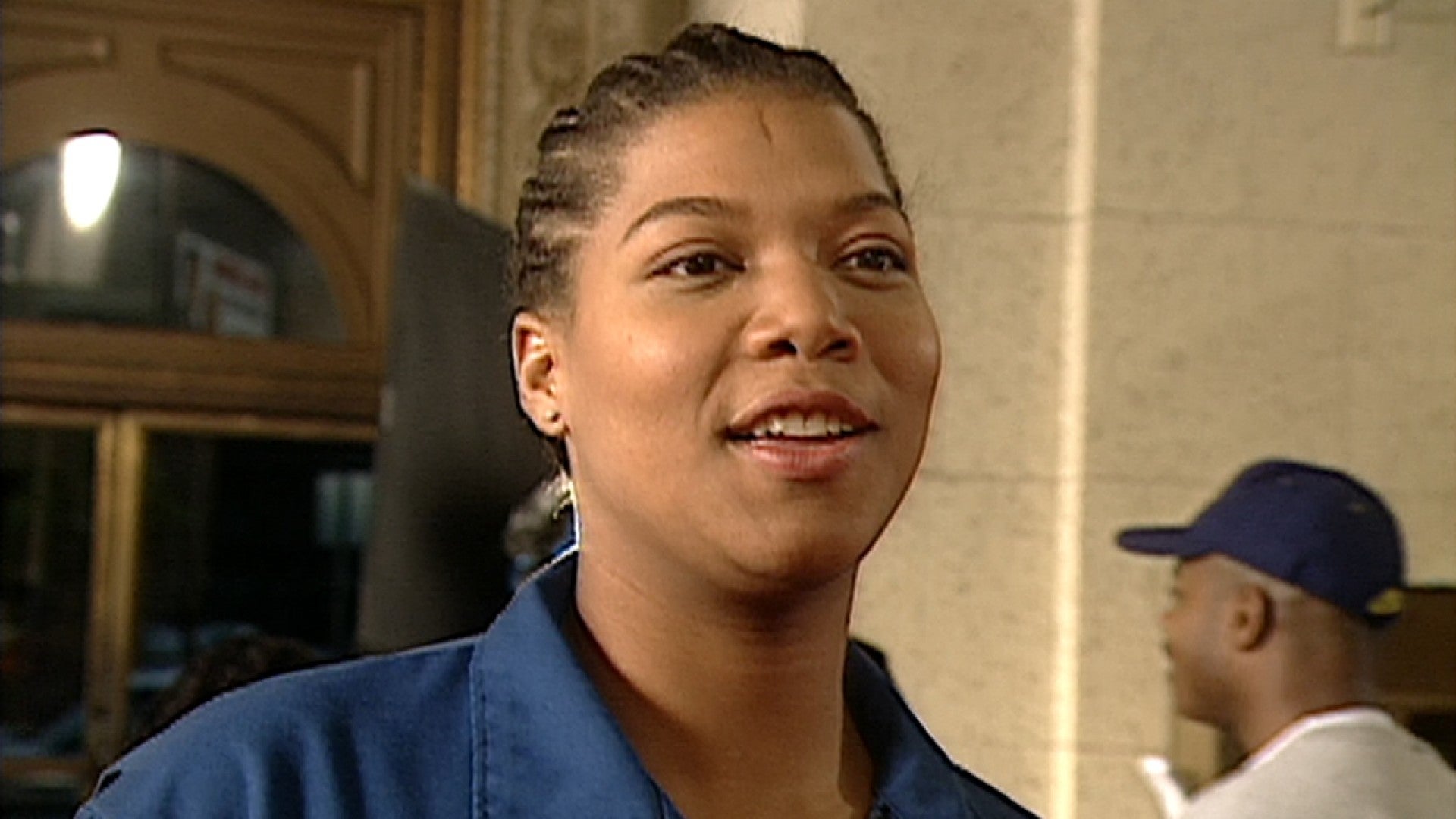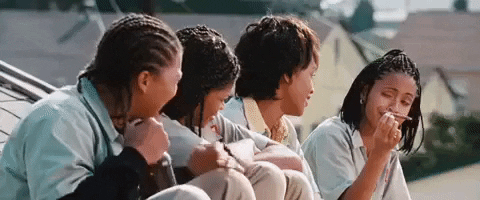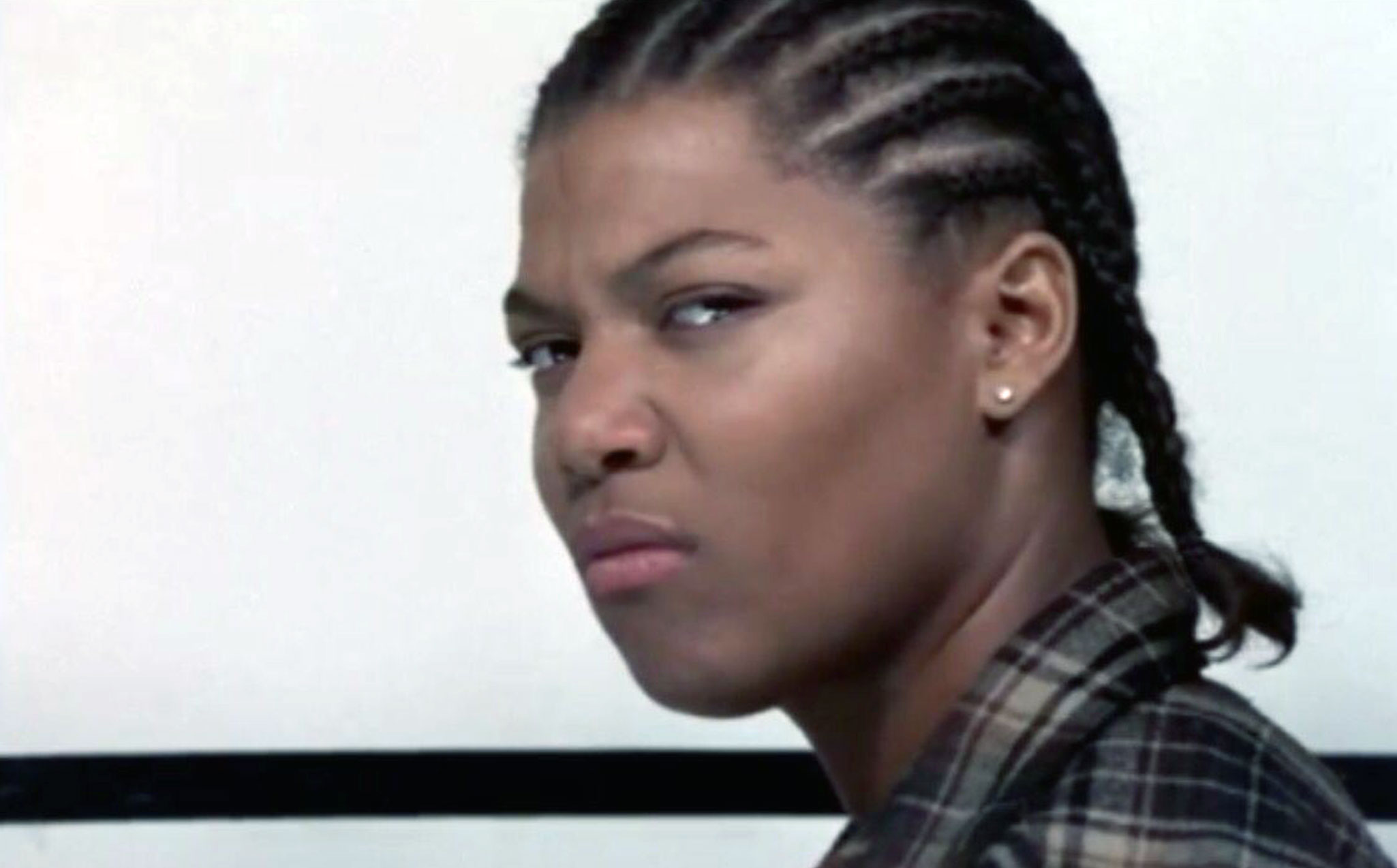Gay Best Friend: Cleo (Queen Latifah) in "Set It Off" (1996)
 Tuesday, June 29, 2021 at 2:00PM
Tuesday, June 29, 2021 at 2:00PM A series by Christopher James looking at the 'Gay Best Friend' trope
 Queen Latifah stood out in the ensemble thriller "Set It Off" as Cleo, a butch lesbian bank robber.Be gay, do crimes.
Queen Latifah stood out in the ensemble thriller "Set It Off" as Cleo, a butch lesbian bank robber.Be gay, do crimes.
The film business was born with stories of outsiders committing crimes just to survive. The entire gangster genre is built on that premise. Bonnie & Clyde captured the zeitgeist by making robbing banks seem cool. F. Gary Gray’s 1996 thriller Set It Off gives us a very different view of the Bonnie & Clyde story. The film focuses on four inner-city black women each pushed to the brink by a financial system working against them. Rather than lay down and take it, they band together and start robbing banks just to get by. The cast, which includes Jada Pinkett (before Smith), Queen Latifah, Vivica A. Fox and Kimberly Elise in her first role, is uniformly excellent, building a dynamic that believably has lasted decades.
For the purposes of Gay Best Friend, we’ll take a look at our butch firecracker, Cleo, played with great ferocity by Queen Latifah in the midst of her Living Single fame...
 This is a movie filled with legends only (from left to right, Latifah, Elise, Fox, Pinkett pre-Smith).
This is a movie filled with legends only (from left to right, Latifah, Elise, Fox, Pinkett pre-Smith).
Cleo: Shit, we're ain't robbing stagecoaches, man! We need something to set it off with.
After a violent bank robbery leaves multiple people dead, bank teller Frankie (Fox) is fired from her job simply because she knew the gunman. Down on her luck and without a job, she turns to her friends to get her a job as a janitor with them. The childhood friends are all in the midst of their own financial and personal woes. Stony (Pinkett) was working to put her younger brother through college, only to watch him gunned down by the police who tenuously assumed he was involved with the homicide at Frankie’s bank. T.T. (Elise) gets her son taken away after an incident on the job and must come up with enough money for a babysitter in order to get him back.
In contrast to most of the movies we’ve covered, the queer character isn’t the one burdened with all the trauma. Cleo (Latifah) may have prior convictions, but she’s able to get by with the janitor job and enjoys a nice life with her girlfriend Ursula. Yet, she doesn’t see a point in her life where she can achieve more operating on the straight and narrow. When Frankie mentions that she has the knowledge of how to run a bank, Cleo is the first one to get the girls excited about the job. Cleo already knows what Stony and T.T. figure out - the world isn’t looking out for them. The only people looking out for them are each other. Their bank robbing isn’t a Robin Hood act of redistributing wealth, it’s a way for these women to claim reparations from a world that will never let them get ahead. Each of them as black women are othered in the world around them. Even within their own microcosm of South Central LA, Cleo knows herself to be “other” because of her sexuality and her butch presentation. However, this frees her up to never conform to the world around her or try and play by the rules. The rules weren’t made for her.
Jada Pinkett and Blair Underwood may be the main couple of the movie, but I couldn't stop thinking about Cleo and Ursula.
Frankie: [as Cleo grabs her breast, she pushes her away] Cleo! I done told you! I'm strictly-dickly.
T.T.: [speaking to Cleo] See now, I'm gonna tell Ursula.
Cleo: [makes fist and pretends to hit T.T] You ain't telling nobody!
T.T.: [laughs]
Carmen Phillips brilliantly wrote on Autostraddle recently about how Queen Latifah’s performance as Cleo is a “Black lesbian icon.” I must agree that there’s something powerful, thrilling and, most of all, fun about how F. Gary Gray and screenwriters Takashi Bufford and Kate Lanier decided to showcase Cleo’s sexuality. She’s often seen making out with her girlfriend Ursula (Samantha MacLachlan) and celebrates their first bank heist by buying Urusla lingerie. Cleo gets to not only have a relationship, she gets to be horny.
There’s something wonderful about watching a movie where Cleo’s desires are celebrated, rather than made a plot point. Her sexuality never drives the story forward or becomes a source of conflict. By that same token, the other women in the group never treat Cleo’s sexuality as an issue or something that needs to be discussed. In fact, they will often joke around with her, rather than treat it as a “sore subject” or “something we don’t talk about.” It’s merely who Cleo is and there’s not anything anyone can do to change her. The story and conflict derives from the way the world oppresses these women and how they fight the system (and each other) in the process.
 Queen Latifah gives a fully rounded performance that helps sidesteps generalizations that could've occurred within the character.
Queen Latifah gives a fully rounded performance that helps sidesteps generalizations that could've occurred within the character.
Frankie: I know you out of money by now, Cleo. Now what you going to do?
Cleo: Rob another goddamn bank! What the fuck is ya'll thinkin?
If Cleo wasn’t the primary instigator to rob the first bank, she sure is for the rest of the robberies. While some of the women lay low, Cleo is more than content to quit the janitor job early and spend the robbery money as fast as the women got it. In Aubree Calvin’s “Brief History of Black Queer Representation in Cinema” on Nerdist, she writes about Cleo as a “step forward” while also acknowledging how it sets her up as the “natural aggressor who enjoys crime.” As stated earlier, Cleo is the only woman in the group not given a tragic backstory that thrusts them into a life of crime. The movie is clear in defining Cleo as the only one in the group with prior convictions. There is something odd in how the movie equates Cleo’s masculine demeanor with a closer proximity to aggression and violence. Still, it is thanks to Queen Latifah’s sensitive performance that Cleo never feels too much like one thing. There’s a heart behind her bravado, which is why the group is able to come back together after arguments.
*Spoilers Ahead*
In the tradition of “killing the gays” in movies, Cleo does suffer and die for her crimes against the system. Granted, all but Stoney end up dead by the end of their final grand heist of the Downtown Federal bank where Stoney’s boyfriend Keith (Blair Underwood) works. The movie was billed as the “black Thelma and Louise” for some when it was released. In some respects, each of the women get a similar “blaze of glory” death moment. Cleo recognizes she likely won’t make it out alive but still busts through a police barricade. Yet, each death feels more charged and traumatic than that moment of exhale in Thelma & Louise. Watching the police shoot these women in the front (Cleo) or in the back (Frankie) is tough to swallow due to the severe and continued attacks on black people by the police. The house always wins. The central quartet didn’t die specifically because they were greedy or wanted one last score. They died because the system around them would never let them win. So why not go out with a bang like Cleo? Of all the Gay Best Friend characters we’ve mentioned, none of them went out like Cleo.
It’s interesting to think of this performance in the context of Latifah’s on-screen and off-screen persona since from the moment she arrived in Hollywood, there were always lesbian rumors. The Living Single star began to crossover to the mainstream in the early 00s. In addition to an Oscar nomination for her role as Matron Mama Morton in Chicago, Latifah became a rom-com star in movies like Brown Sugar, Last Holiday and Just Wright. Along with high profile roles in Barbershop 2: Back in Business and the spinoff Beauty Shop, Latifah was a minted star. Even in a post-Ellen world, a major star coming out might have stunted her four quadrant career, particularly in the romantic comedy genre. For years she adamantly refused to discuss her private life but this weekend she finally came out acknowledging her love for her longtime partner "Eboni my love" and ending with "Happy Pride!" while winning the BET Lifetime Achievement Award.
Latifah’s charisma has always been infectious (Last Holiday is a movie I can always put on for a smile) and it’s easy to see how she became such a massive star. Yet, there’s something looser and more honest about her performance as Cleo. There’s still this livewire energy that was present in her star persona in films like Bringing Down the House or Taxi. Those almost read as precursors to Melissa McCarthy’s post-Bridesmaids comic persona - brash women who exist at odds with the “more normal” world around them. In Set It Off, Cleo gets to be boisterous, but very much part of the tapestry of the world around her. In her own way, Cleo found a way to luxuriate living her truth, which was something that Queen Latifah understood how to express.
Previously in Gay Best Friend
pre stonewall
- Plato (Sal Mineo) in Rebel Without a Cause (1955)
- Sebastian Venable in Suddenly Last Summer (1959)
- Calla Mackie (Estelle Parsons) in Rachel Rachel (1968)
post stonewall
- Erich (Norbert Weisser) in Midnight Express (1978)
- Toddy (Robert Preston) & Squash (Alex Karras) in Victor/Victoria (1982)
- Dolly Peliker (Cher) in Silkwood (1983)
- Buffy (Charles Grodin) in Woman in Red (1984)
1990s and the 2000s
- Tim (Nathan Lane) in Frankie & Johnny (1991)
- Hedy (Jennifer Jason Leigh) & Graham (Peter Friedman) in Single White Female (1992)
- Sammy Gray (Steve Zahn) in Reality Bites (1994)
- Gareth (Simon Callow) and Matthew (John Hannah) in Four Weddings and a Funeral (1994)
- Jane (Whoopi Goldberg) in Boys on the Side (1995)
- Sterling (Patrick Stewart) in Jeffrey (1995)
- George Downs (Rupert Everett) in My Best Friend’s Wedding (1997)
- Simon (Greg Kinnear) in As Good As It Gets (1997)
- George Hanson (Paul Rudd) in The Object of My Affection (1998)
- Bill Truitt (Martin Donovan) in The Opposite of Sex (1998)
- Michael (Stuart Wells) in Billy Elliot (2000)
- Robert (Rupert Everett) in The Next Best Thing (2000)
- Patti (Sandra Oh) in Under the Tuscan Sun (2003)
- Michael (Robin de Jesús) in Camp (2003)
- Damian (Daniel Franzese) in Mean Girls (2004)
- Nigel (Stanley Tucci) in The Devil Wears Prada (2006)
- Wallace Wells (Kieran Culkin) in Scott Pilgrim vs the World (2010)
- Brandon (Dan Byrd) in Easy A (2010)
- Patrick (Ezra Miller) in The Perks of Being a Wallflower (2012)
the now



Reader Comments (7)
Latifah stands out because most people had never seen that kind of representation of a black women on screen before.
She would have made a worthy nominee in supporting actress and nowadays would probably get a massive campaign and win.
Thanks for unearthing this gem of a film and writing with a passion.
She deserved Oscar noms in the '90s for both this and LIVING OUT LOUD.
Thank you for this wonderful article Christopher - Set It Off is such a good film and this remains Queen Latifah’s greatest performance (even though Bessie and Life Support run it close) - she makes my Top 5 in Supporting Actress.
Elise makes my Top 10 and the whole cast is pretty much perfect - has there ever been a more intriguing “hot girlfriend” than Ursula!? I want a film about her!
Thank you for also mentioning Last Holiday (my go-to feel-good film whenever I’m hungover)
Many would argue that Latifah didn’t deserve her Chicago nomination (I agree with them) but a mega-star of her magnitude HAS to be recognised eventually when they missed for a performance like this - so on balance, I wouldn’t change it at all.
She’s the kind of actress who will hopefully grab a Leading win at some point (she probably would have taken it already with Bessie if it went to cinemas and had a good studio campaign behind it - see also Drew Barrymore in Grey Gardens).
Queen Latifah! A true queen.
She's a tough broad.
The queer icon coming out in her BET Lifetime Achievement Award acceptance speech makes a great addendum to this post.
Many would argue that Latifah didn’t deserve her Chicago nomination (I agree with them)
Matron Mama Morton is exactly the kind of flashy character that defaults into the final five regardless of the merit of the performer. But Latifah excelled and the implication that she didn't for the sake of others who weren't necessarily 6 or 7 in vote tallies is a you problem.